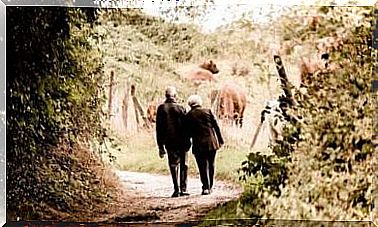Heart Made Of Ice: People Who Find It Difficult To Express Their Emotions

Affection, and its daily demonstration, are no doubt the psychological and emotional arteries that nourish a happy and long-lasting relationship. However, some people do not know how to speak this language of love. Or they may simply refuse to learn it. We say that these people have an ice heart. You are full of contradictions and fears and have surrounded yourself with barbed wire. This, and their inability to express their emotions, creates serious pain in others, including their children.
Unsurprisingly, loving communication is the cornerstone of any enriching relationship. In fact, a lack of it is the number one reason people seek couples therapy. In fact, it is very common for many people to feel disrespected. Often there is an obvious difference in giving and receiving affection between partners in therapy .
“It will always be affection that changes a person’s mind, never anger.”
Dalai Lama
Some psychologists describe the person’s condition as a hunger to be touched. But it is more than that. People with hearts made of ice feel weakened emotions. You have trouble expressing feelings without becoming hostile or reluctant. Few circumstances are as devastating for the social being human as this. If he lingers in this emotional emptiness, sooner or later he will begin to doubt his relationships. He then wonders if love is still there. And his counterpart does that too.

The affection and the emotional survival
Humans need more than just food to survive. Surely our cells need nutrients so that they can do all of these great things to keep us alive. As strange as it sounds, we are also fueled by affection. It gives us strength and the feeling that we are part of a group. A group with which we can identify, in which we feel safe and happy.
A good example of this is Juan Mann, the founder of the celebrated Free Hugs movement, which gives out free hugs. He felt so deprived of his lack of human contact that he thought of the worst for a while. He was abandoned by his partner, had no friends, divorced parents and a sick grandmother. Juan Mann thought he was going to die until something great happened at a party: a girl gave him a spontaneous hug as an expression of her compassion. The cold left his heart for a moment. And the world was in harmony, in equilibrium, and his life had meaning again.
After this experience, Juan Mann decided to stand on the street with a large sign. His goal was to offer free hugs to anyone who needed them. This was therapeutic to him in a wonderful way. Until then, he had shied away from contact and affection so much that he fell into an extreme depression. But now he could recover.
In a documentary, he said that he was most excited about people’s reactions. Although initially surprised , all of them had smiles on their faces as they broke away from the embrace. It was good for everyone.

Heart of Ice – or the inability to show affection
We know that affection is so primitive and necessary that we see it in both animals and humans. Even animals look for this contact, for an emotional connection to one another and to humans. So if these connections and expressions are natural, fundamental and magical at the same time, why are there people who act like they have an ice heart?
- The first thing we need to understand is that there is no universal reason for having difficulty expressing emotions. We cannot pigeonhole all of these people or behaviors together. Nor can we say that their behavior is necessarily pathological.
- One of the most common causes of hearts made of ice is poor self-esteem. This lack of certainty about who we are can make us defensive in our relationships. So we try to reduce the risk of being rejected. We do this by hiding what we think is a weak point.
- We may think that treating others lovingly and emotionally is a sign of weakness. It is as if this behavior reveals our poor self-esteem. So we think it is wiser to keep your distance. We avoid showing affection and maintain our facade of strength.

- There is another aspect that we cannot ignore: how we were raised. If we were born and raised in an environment of lack of affection, an environment in which connectedness was absent, then we probably don’t understand, appreciate, or dare to show affection either.
- Let’s not forget about alexithymia. This disorder is not only associated with an inability to show emotion. It also includes a lack of self-awareness and empathy. People with this disorder often focus only on the external, the rational, and the tangible. Alexithymia often occurs with autism spectrum disorders.
How should we deal with people who have an ice heart?
We cannot force others to show their affection. This strategy never works. In fact, this attempt could be counterproductive and cause the opposite. The most appropriate thing to do is act based on each person’s needs and their psychological and emotional reality. In many cases, the focus is on the other person’s self-esteem and building a more positive self-image. Remember that there is a deficit or problem behind the spouse, friend, or child who cannot show affection. This must be resolved in a joint effort.









